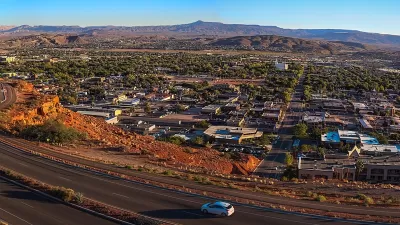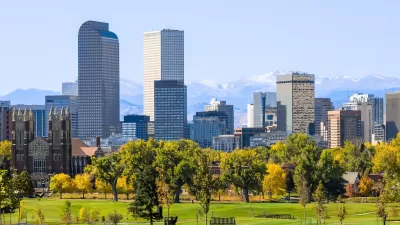Replacing lawns with native plants and grasses saves water and improves biodiversity, but some cities make the practice illegal.

In a piece in Next City, Amy McEuen calls for “yard reform,” writing that it’s time to rethink the American lawn. “To slow the pace of extinctions and pull carbon from the sky, we need laws that incentivize replacement of grass with native plantings.”
While some people may find it “impossible to unimagine” the grass lawn, more people are recognizing the value of native plants and replacing their lawns with local flora, reducing the use of water and harmful fertilizers and pesticides. But some cities and private homeowners associations actively oppose such changes, even issuing citations to homeowners who replace their lawns.
On the other side, “Some states strongly incentivize lawn removal. Nevada’s “cash for grass” rebate program pays $3 per square foot of turf grass that is removed and replaced with desert plants.” Nevada also banned ornamental grass, while Minnesota reimburses homeowners who convert lawns to pollinator gardens. McEuen recommends the creation of a model environmental municipal code similar to the Model Penal Code, which “would send local and state lawmakers the message that they need to make replacing our lawns not just acceptable but advisable.”
FULL STORY: It’s Time For Cities To Rethink Lawn Policy

Alabama: Trump Terminates Settlements for Black Communities Harmed By Raw Sewage
Trump deemed the landmark civil rights agreement “illegal DEI and environmental justice policy.”

Planetizen Federal Action Tracker
A weekly monitor of how Trump’s orders and actions are impacting planners and planning in America.

How Atlanta Built 7,000 Housing Units in 3 Years
The city’s comprehensive, neighborhood-focused housing strategy focuses on identifying properties and land that can be repurposed for housing and encouraging development in underserved neighborhoods.

In Both Crashes and Crime, Public Transportation is Far Safer than Driving
Contrary to popular assumptions, public transportation has far lower crash and crime rates than automobile travel. For safer communities, improve and encourage transit travel.

Report: Zoning Reforms Should Complement Nashville’s Ambitious Transit Plan
Without reform, restrictive zoning codes will limit the impact of the city’s planned transit expansion and could exclude some of the residents who depend on transit the most.

Judge Orders Release of Frozen IRA, IIJA Funding
The decision is a victory for environmental groups who charged that freezing funds for critical infrastructure and disaster response programs caused “real and irreparable harm” to communities.
Urban Design for Planners 1: Software Tools
This six-course series explores essential urban design concepts using open source software and equips planners with the tools they need to participate fully in the urban design process.
Planning for Universal Design
Learn the tools for implementing Universal Design in planning regulations.
Jessamine County Fiscal Court
Caltrans
Institute for Housing and Urban Development Studies (IHS)
City of Grandview
Harvard GSD Executive Education
Toledo-Lucas County Plan Commissions
Salt Lake City
NYU Wagner Graduate School of Public Service





























